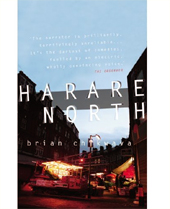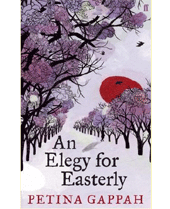The
year 2009 presents Zimbabwe watchers with the hope of new beginnings.
A strange new animal blunders onto the political stage. Ungainly
and unnerving, the ZANU-PF/MDC Government of National Unity is a
leadership that comes both with tomorrow’s promise and the
taint of yesterday’s blood.
On the literary stage Brian Chikwava’s
Harare North and Petina Gappah’s An Elegy for
Easterly also arrive with some promise, while not exactly untouched
by the gritty reality of the worlds they chronicle. There are many
points of intersection in these two books. For one, they are debuts
by a young generation of Zimbabwean writers. For another, they are
both firmly grounded in the defining crises in the house of Zimbabwe.
Brian Chikwava announced his literary
aspirations with a Caine Prize win in 2004 for his short story,
Seventh Street Alchemy. His book has been awaited ever since.
In 2009, he makes good with Harare North, a 230-page first
person confessional of a flawed narrator-fugitive arriving in London
from Zimbabwe. The narrator is nameless (although for the convenience
of reviewers and book club discussions, writers really ought to
have a heart) and shall be so-called in this review.
Nameless was a member of the paramilitary
youth wing of the government’s ZANU-PF party. His band of
Green Bombers gets carried away during a routine chastisement session
(euphemistically called ‘forgiveness’) and their victim
dies. Mugabe’s government cannot be as Machiavellian as generally
painted, because Nameless now has to run for his life. A bribe is
supposedly required to ‘kill’ the case, and this is
the sole reason why he flees to London. That old city is not so-called
in this book, of course. That great coloniser is linguistically
appropriated by her enfranchised colony. Harare (which was previously
named Salisbury after an old London prime minister) gets into the
name game with gusto and London is rechristened ‘Harare North’,
just as Johannesburg becomes ‘Harare South’. In the
universe of Nameless’ world, Harare is the unquestionable
centre.
And some world it is. Nameless is different
from all those other Zimbabwean immigrants who have arrived in Harare
North for the better life. All he wants in his pocket is the equivalent
of US$5000 to sort out his Police case file and his uncle’s
loan of a flight ticket, after which he was determined to return
home to complete his mother’s traditional burial rites. The
steady advance of Mugabe’s bulldozers on his mother’s
grave adds some urgency to his narrative as he tries to quickly
get to grips with his immigrant experience.
Yet, he is a ‘principle man’
and will not stoop as low as his ‘BBC’ (British Bottom
Cleaner) compatriots who will do any old ‘graft’ to
get by. His preference is the cushy hotel porter beat at swank hotels
where a few lavish tips from passing Saudi princes could soon set
him up for the flight back into Harare. Unfortunately, Chikwava
does not do fairy tales. Our man of principle is soon forced to
supplement his chips shop wages with a spot or two of blackmail,
all too little too late to force a happy ending.
The grammatical English speaker arrives
at Harare North with some discomfiture. London’s name
is not the only thing Mr. Chikwava has taken liberties with. The
book is not rendered in conventional grammar, or in any variant
of the lingo that the Zimbabwean immigrant will be familiar with.
This is make-work English ala Saro Wiwa’s Sozaboy and Iweala’s Beasts of No Nation, although
far more accessible. In Harare North the distressed
language of Nameless’ voice flags up his abbreviated education
and foreshadows his teetering grasp at reality, while producing
regular flashes of two-touch humour:
‘Does anyone have any question?’
the foreman ask, with cigarette in mouth. He don’t sound
English. The cigarette in his mouth is in big trouble –
on one end he have put it on fire and on the other he is chewing
it with them long brown teeth. Me I am not doing no graft for
this man, I make up my mind quick. P.51
It is in order to advise aspiring writers
of the literary story that not all narratives from Africa need to
be served up in its own patented variant of language. It may be
an eloquent shorthand for authenticity but we must beware its fetishisation.
This is an important question. The English is foreign to Africa
and an appropriate, creative, use of it would necessarily subvert
it to some extent or other. In the sense of this subversion, Tutuola
is still far head of the creative clan — in the transparency
of language relative to culture and in the imperative of story relative
to language.
In The African Writer and the English
Language, Chinua Achebe advises his fellow writers to
aim to use English in a way that
brings out his message best without altering the language to the
extent that its value as a medium of international exchange will
be lost...
I feel that the English Language
will be able to carry the weight of my African experience. But
it will have to be a new English, still in full communion
with its ancestral home but altered to suit its new African surroundings.
And yet it is not every story that
requires a shape-shifting language. After a half-dozen pages of
Chikwava’s broken English, the reader will get into the rhythm
of Nameless’ cracking narrative and be pulled along by the
story.
Such a pull would not have helped Petina
Gappah’s book. She has written a collection of stories, not
a novel, and there is no single narrative to ‘pull’
the reader from cover to cover - beyond the enjoyment of one story
and the anticipation for the next. From that perspective, the book
should probably have started with the Mupandawana Dancing Champion. It is a story that arrives in this collection already
accomplished in its own account, having previously won the Zimbabwean
Mukuru Nyaya prize for comic writing. It can be summarized by the terminal headline
that made its hero famous: Man Dances Self to Death, but
on the way to that rather unfortunate end, Ms. Gappah has created
a touchstone of unerring humour.
The comic instinct is another point
of intersection between these two writers, their uncensored, inherently
subversive way of apprehending life:
It was five years since Josephat’s
wife had married Josephat. She had tasted the sound of her new
identity on her tongue and liked it so much that she called herself
nothing else. ‘This is Josephat’s wife,’ she
said when she spoke into the telephone on the hillock above the
farm. ‘Hello, hello. It’s Josephat’s wife.
Josephat’s wife.’ [An Elegy for Easterly, p.38]
To the right of station entrance
one newspaper vendor stand beside pile of copies of Evening Standard.
On front page of every one of them papers President Robert Mugabe’s
face is folded in two. I can still identify His Excellency. The
paper say that Zimbabwe has run out toilet paper. That make me
imagine how after many times of bum wiping with the ruthless and
patriotic Herald newspaper, everybody’s troubled buttock
holes get vex and now turn into likkle red knots. But except for
this small complaint from them dark and hairy buttocks, me I don’t
see what the whole noise is all about. [ Harare North, p. 1]
On the evidence of these books, these
young Zimbabweans have honed a voice to serve fillets of their realities
to appreciative compatriots. For all their universality, the nationality
of their fiction – and its individual focus – is clear.
Harare North is more about Harare than her northern suburb
of London. An Elegy for Easterly is more about the Give-me-Twenty-Cents-Marthas
of this world than their indifferent mother-Zimbabwe.
For the purpose of this identification,
both the language of the fiction and the colour of the characters
are important. [Tsitsi now start wailing in proper
native way, wrapping them arms around she head and throwing sheself
about on the hospital floor in disorderly way and frightening English
people. Harare North P. 99,]
The medium of the story collection
gives Ms. Gappah a greater opportunity than her compatriot to cast
a writerly eye over the breadth of inspiration that is their homeland.
None of the writers are disconnected politically, but their main
engagements are with the private fates of their characters. At
the Sound of the Last Post is probably Gappah's most political.
The story is angry, the humour more acerbic than most, but the jaded
female narrator is just as scheming and cynical as the political
leaders who are the foil of her sarcastic narrative.
Gappah's stories plumb rejection, indifference
and deprivation. The fear of AIDS flits lithely through these pages.
As a snapshot of marriage, The Negotiated Settlement could
have been taken anywhere in the world from Brisbane to Cairo. In
The Maid from Lalapanzi will probably be found the dog with
the longest name in the world (They shot into the air to frighten
people, and when her grandmother’s dog Pfungwadzebenzi barked,
a guerrilla shot him in the stomach and he limped off to the forest
to die). It is not the dog that stays with the reader afterwards
though, but the sadness of a war that continues to harvest its human
victims years and years after the last shot was fired.
For all the humour, there is a sadness
that underlines her best stories. Characters stand indelibly beyond
the geography of their locales. Something Nice from London, first aired in Farafina magazine, is anything
but. The Annexe Shuffle is too intimate for humour, an intense
story accentuated by a cyclical, cloning rejection. The author
indulges the traditional tropes of African literature. The inmate
of a psychiatric war is asked what tribe she belongs to,
‘This is what slows progress
in this country,’ Emily screams. ‘The notion
of tribe is a patronising Western construction,’ …
‘The Goths, Vandals and Visigoths, those were tribes, they
talk about Serbian nationalism, but African tribalism. I do not
have a tribe, I belong to the nation.’ P.61, An Elegy for
Easterly
This short story (and the psychiatric
ward) is not the format to investigate what ‘nation’
Emily does belong to – whether the ethnic nation of her biological
ancestry or the political nation of ‘Western construction’.
Nameless has some native intelligence,
but it is uneven. He lives his life under a false death sentence,
because he thought that a HIV-negative result was the calamity, ‘how can negative be good news?’ [p. 211]. Yet,
it is all a pretence. The mind behind the narrative is quick and
strains to stay unversed. The mask will slip on occasion:
The past always give you the
tools to handle the present. Add small bit of crooked touch to
what you do and everyone soon get startled into silence and start
paying proper attention and respect to you…. It’s
not accident that ‘skill’ and ‘slaughter’
start with a crooked letter. Every jackal boy know that too. Remove
the crooked touch from each of them those two words and suddenly
you kill laughter. P. 69
But this reviewer is not complaining.
Harare North is an important Zimbabwean novel and significant
immigration fiction that places significant expectation for the
second novel of Mr. Chikwava. We trust he will handle the pressure
rather better than his hapless protagonist. In 2010, Petina Gappah
will cut her teeth on the novel format as she delivers her first
novel, but she is without a doubt, a master of the short story.
On the evidence of 2009’s offerings, African writing has two
new chroniclers of the Zimbabwean condition. They have now to tear
up the dog-eared script of Serial Disappointment that has plagued
the political stage and try for a more sanguine ending.  |











![]()
![]()


